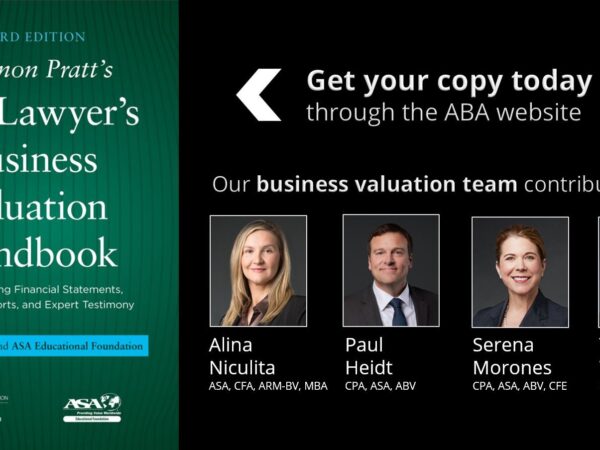

3 Questions from Attorneys on Business Valuation in 2024 – Part 2
By Paul Heidt, CPA, ASA, ABV and Alina Niculita, ASA, CFA, ARM-BV, MBA
Our team recently presented a business valuation CLE to several local law firms. We have compiled a few common questions attorneys asked and have answered those questions below.
- In a business valuation context, how is the standard of value, “Fair Value,” typically defined?
ANSWER: When defining a business valuation engagement, an appraiser must fully understand the standard of value that applies. The “Fair Market Value” standard of value, which is most often used in tax situations and many buy-sell agreements, is defined as “the price at which the property would change hands between a willing buyer and a willing seller, neither being under compulsion to buy or sell and both having reasonable knowledge of relevant facts.”[1]
“Fair Value” on the other hand, is the typical standard of value for state actions, including dissenting rights and shareholder oppression cases, and can vary from state to state.[2] The Uniform Business Corporation Act defines “Fair Value” as “the value of the shares immediately before the effectuation of the corporate action to which the dissenter objects, excluding any appreciation or depreciation in anticipation of the corporate action unless exclusion would be inequitable.”[3] In other words, what was the value of the entity prior to the corporate act that the dissenter objects to. Since the definition of “Fair Value” can vary from state to state, it is important for appraisers to have discussions with attorneys who are familiar with a particular state’s statutes and case law.[4]
- What are typical business valuation discount rate ranges?
ANSWER: The discount rate is one of the two main inputs of the Income Approach to business valuation along with the expected future cash flows. The discount rate is used to calculate the present value of the expected future cash flows, which is the value of the business under the Income Approach. The discount rate is a function of the riskiness of the investment in the business.
A fundamental concept in business valuation is that the higher the risk, the higher the requested return to invest in that business. In business valuation, the riskier the business, the higher the discount rate. What makes a business riskier than others? One example of a business risk is size. Generally, smaller businesses are riskier than large businesses, because of factors such as a lack of diversification, thin management, lack of resources, reliance on key people, and others. As a result of the higher risk, smaller businesses will have generally higher discount rates. Another fundamental concept in business valuation is that there is an inverse relationship between the discount rate and the value of the business. The higher the discount rate, that lower the value of the business. The lower the discount rate, the higher the value of the business.
That’s why it is important to spot discount rates that may be unreasonably low or unreasonably high. While the discount rate depends on the facts and circumstances of each case, reviewers of valuation reports should be alert of cost of equity rates for small to medium size profitable companies that are outside of a 15%-20% range. Special cases warrant rates that are outside this range, of course, but they would have to be explained and supported.
- Why do appraisers typically request five years of the subject Company’s financial statements?
ANSWER: When gathering information at the outset of a business valuation, appraisers typically request five years of the subject Company’s financial statements. Other documents typically requested include management projections, operating agreements, a list of top suppliers and customers, the ownership structure, and compensation of the owners/officers.
Five years of financial statements are typically requested in order to observe trends in the Company’s revenue, expenses, earnings, assets, and liabilities. An extended period of historical financial data allows the appraiser to estimate a normalized level of revenue or earnings or to identify anomalies in the Company’s historical financial statements, such as a significant decrease in revenues due to the Covid-19 pandemic or a one-time increase in professional fees from a legal dispute. For some companies or industries, such as construction companies, more than five years of financial statements may be requested due to the cyclical nature of the industry.
[1] Treasury Regulation 20.2031-1.
[2] “Financial Valuation: Applications and Models, Second Edition,” James R. Hitchner, Wiley.
[3] Oregon Revised Statutes, Section. 60.551(4).
[4] Note, the “fair value” standard is defined differently for financial reporting as required by generally accepted accounting principles (GAAP) and the Securities and Exchange Commission (SEC).
Want more on this topic? See our previous articles:
Answers to Top 3 Questions on Business Valuation Approaches
Answers to Attorney FAQs on Preferred Business Valuation Methods.
Join us for a free virtual CLE on November 13, 2024. Register here.
————————————————–

Paul Heidt, CPA, ASA, ABV brings close to 25 years of specialized experience in financial analysis and research. He has performed 250+ business appraisals for litigation, gift and estate tax planning, marital dissolution, business transactions, reorganizations and succession planning.
503-906-1583 | [email protected]
 Alina Niculita, ASA, CFA, ARM-BV, MBA is a valuation and testifying expert who has specialized in business appraisal and appraisal review for litigation cases and business transactions for two decades. She has appraised hundreds of companies in diverse industries and sizes up to several billion dollars in revenue and testified in support of her opinions.
Alina Niculita, ASA, CFA, ARM-BV, MBA is a valuation and testifying expert who has specialized in business appraisal and appraisal review for litigation cases and business transactions for two decades. She has appraised hundreds of companies in diverse industries and sizes up to several billion dollars in revenue and testified in support of her opinions.
503-906-1585 | [email protected]





